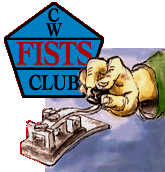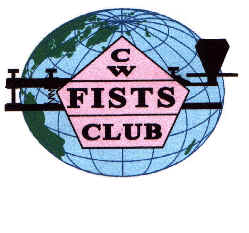![]()
WELCOME.
Thanks for taking time to visit.
I'm hoping that you've landed on my page by typing the words "Morse Code" or "Amateur Radio" in one of the many search engines available on the internet.. If not; please don't "Dash off" Take time to have a look around, and who knows? you may gain an interest in a form of communication that is around 170 years old! Invented by Samuel FB Morse. And is still in use by amateur radio enthusiasts (More commonly known as "HAMS") around the world.
For more on who we are and what we do regarding the use and preservation of Morse code; there's a link at the bottom of this page that will open windows to a whole new world of hobby communication.. (And it's much more fun than texting, face-twitter etc. etc.)
Go on, have a browse around..

![]()
A little about me:
I'm Rob; a licenced radio amateur; and I enjoy using the mode of communication that is known as Morse code. I've been involved with the "International Morse Preservation Society" (More commonly known as the FISTS CW Club) for a number of years. I first joined the society in January 1999. (The word "FIST" in this context means nothing more than the Morse operators keying characteristic; imagine it as your style of handwriting, which is as individual as you!"
Amongst other duties associated with the society;
from 2006-2012 I was the FISTS UK/EU activity coordinator within the society.
(From January the first 2013, this post has been taken up by Chris Pearson; G5VZ)
Take a look at the 2012 editions of "Brasspounder" The societies monthly online activity publication. First published by myself in 2006.
Earlier editions can be found on the societies main website; follow the;"WHO ARE WE" link.
*******************************************************************************************************
********************************************************************************************
I'm now looking after the QSL bureau on behalf of the society.. "What are QSL's" I hear you ask! A good question, so, take a look at this link. QSL cards
For more detailed information on the society visit:
If you're new to amateur radio, or wondering what it is.
Each country has its own administration for issuing amateur radio transmitting licences... YES! you do have to have a transmitting licence, but don't be put off by this; here in the UK many radio clubs do courses where you can gain a licence! Don't be put off by the word "Courses" either! It's not like being at school, although you follow a structured path of learning with an exam at the end of the course; its a good way to exercise the grey cells, meet new people, and if successful have your own amateur radio station at home and chat with other like minded individuals!
Here in the UK, the amateur radio transmitting licence schedule is managed by the "Radio Society of Great Britain"
This is the national society representing UK amateurs; go to their website for more information www.rsgb.org Here you can find out where your local club or venue is where you can enrol on a course. The UK has three levels of licence; Foundation, intermediate, and advanced; and you must do them in that order to progress to the full (Advanced) licence. BUT! there's no time limit to progress, or if you feel comfortable at whatever level you're at; then you can stay there, observing the restrictions that each level of transmitting licence holds.
You'll hear members of this society and countless others worldwide transmitting Morse code! and you'll think "Thats sounds interesting" so know you'll know where to come for help and encouragement in learning the code!
Also, if you cant wait to get a transmitting licence, why not consider getting a receiver and become a short wave listener? Many of us did this before gaining a transmitting licence, it helps tremendously with your course; which you'll want to do once you've heard what the radio-waves are saying!
If you're outside of the UK, the same applies, contact your local radio club, administration for more information.
Thanks for stopping by, I hope we'll meet on air sometime in the future.
